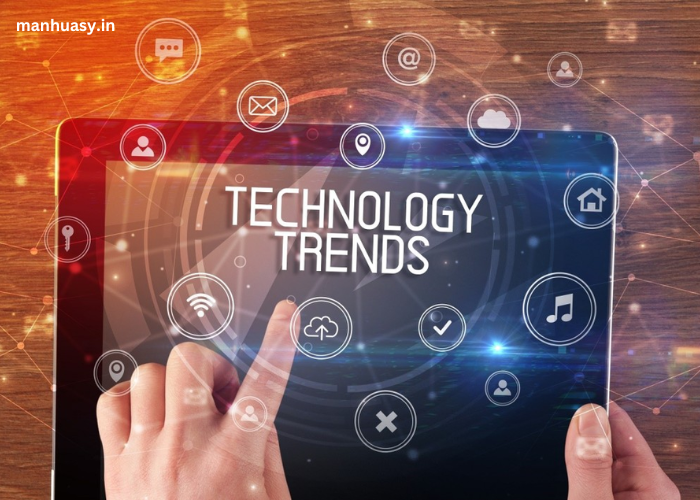Revolutionary Technology Trends Driving Industry Transformation
The technological landscape is evolving at an unprecedented rate, and 2025 promises to be a year of massive change across industries. From artificial intelligence (AI) to blockchain, 5G, and quantum computing, the emergence of these technologies is transforming businesses and sectors around the globe. Companies must stay on top of these revolutionary trends to remain competitive, innovate, and meet changing consumer demands. In this article, we explore the key technology trends that will reshape industries in 2025 and drive the future of business transformation.
The rapid advancement of technology is driving disruption across industries. In 2025, we will witness groundbreaking changes as innovative technologies redefine how businesses operate, deliver services, and connect with customers. These technological shifts are set to streamline operations, improve decision-making, and create new business opportunities. Understanding and adapting to these trends will be crucial for businesses to thrive in an increasingly digital world.
Key Points:
- AI and automation will lead to smarter decision-making and increased efficiency.
- 5G and IoT will foster faster, more reliable connectivity.
- Blockchain will transform industries by offering secure, transparent data management.
1. Artificial Intelligence and Automation
Artificial intelligence and automation are among the most transformative technologies driving change across industries. AI systems are becoming smarter and more capable of handling complex tasks, enabling businesses to automate operations, optimize processes, and enhance customer experiences.
How AI and Automation Will Revolutionize Industries in 2025
AI’s ability to process and analyze massive amounts of data is making it invaluable for industries such as healthcare, retail, finance, and manufacturing. By 2025, AI-powered solutions will play a vital role in automating tasks such as customer support, predictive maintenance, and supply chain optimization. Additionally, AI’s ability to learn and adapt will help businesses make data-driven decisions in real-time.
In sectors like healthcare, AI will revolutionize diagnostics and treatment plans by analyzing medical data to identify patterns that humans might miss. In retail, AI-driven recommendation engines will offer personalized shopping experiences, driving sales and customer satisfaction.
Automation, powered by AI, will also free up human workers from routine tasks, allowing them to focus on more strategic activities that require creativity and critical thinking.
Example:
- Healthcare: AI will help doctors detect diseases earlier and more accurately by analyzing medical imaging and genetic data.
- Retail: AI will recommend personalized products based on consumer behavior, driving conversion rates and customer loyalty.
AI and automation are set to create new efficiencies, reduce costs, and drive innovation across industries.
2. 5G and the Internet of Things (IoT)
The rollout of 5G technology is one of the most exciting developments in the tech world. With faster speeds and lower latency, 5G is poised to enhance connectivity in ways that were previously unimaginable. When combined with the Internet of Things (IoT), which connects devices and sensors to the internet, 5G will create a new era of interconnected systems and smart devices.
How 5G and IoT Will Impact Industries in 2025
5G’s high-speed connectivity will enable IoT devices to function more efficiently and reliably. In industries such as manufacturing, healthcare, and transportation, 5G and IoT will create smart ecosystems that allow for real-time monitoring, data analysis, and automation. This will lead to improved operational efficiency, reduced costs, and enhanced customer experiences.
For example, in smart factories, 5G-enabled IoT devices will monitor equipment performance, enabling predictive maintenance and preventing costly downtimes. In healthcare, IoT-enabled wearables will track patients’ vital signs in real-time, allowing for proactive care and quicker interventions.
The combination of 5G and IoT will also accelerate the development of autonomous systems, such as self-driving cars and drones, by providing the fast and reliable communication needed for these technologies to function safely and efficiently.
Example:
- Manufacturing: IoT sensors connected through 5G will optimize production lines by predicting when maintenance is required, reducing downtime.
- Healthcare: IoT-enabled wearables will monitor patients remotely, improving the quality of care and reducing hospital readmissions.
By 2025, 5G and IoT will unlock new levels of connectivity and automation, transforming industries across the board.
3. Blockchain and Distributed Ledger Technology (DLT)
Blockchain technology has gained popularity in recent years, primarily due to its association with cryptocurrencies. However, blockchain’s potential goes far beyond digital currencies. At its core, blockchain offers a decentralized, secure way to record and store data, making it ideal for a wide range of applications in various industries.
How Blockchain Will Transform Industries in 2025
Blockchain’s ability to provide transparent and immutable records makes it invaluable for industries such as finance, supply chain, and healthcare. By 2025, blockchain will be widely used to streamline transactions, ensure data integrity, and enhance security. In finance, blockchain will reduce the time and cost of cross-border payments, while also improving fraud detection.
In supply chain management, blockchain will offer real-time visibility into the movement of goods, ensuring transparency and reducing the risk of fraud. For example, companies can trace the origin of products, ensuring they meet ethical and environmental standards.
Healthcare will also benefit from blockchain’s secure data-sharing capabilities, allowing medical records to be stored in an immutable ledger while ensuring that patient privacy is maintained.
Example:
- Finance: Blockchain will enable faster, cheaper international payments and improve transaction transparency.
- Supply Chain: Blockchain will track every step of a product’s journey, ensuring authenticity and reducing fraud.
Blockchain will revolutionize industries by offering secure, transparent, and efficient data management solutions.
4. Quantum Computing
Quantum computing is a rapidly evolving field that holds the potential to revolutionize industries by solving complex problems that classical computers cannot. While still in its early stages, quantum computing will have a profound impact on industries such as healthcare, finance, and logistics by 2025.
How Quantum Computing Will Impact Industries in 2025
Quantum computers harness the power of quantum bits (qubits), which can exist in multiple states simultaneously, allowing for exponentially faster computations. By 2025, quantum computing will accelerate advancements in areas like drug discovery, material science, and financial modeling.
In healthcare, quantum computing will enable researchers to model complex biological systems, accelerating the development of new treatments and vaccines. In finance, quantum algorithms will be used to optimize investment strategies, reduce risks, and improve forecasting.
Quantum computing will also be instrumental in optimizing logistics and supply chain networks, helping businesses to identify the most efficient routes and manage resources more effectively.
Example:
- Healthcare: Quantum computers will simulate molecular interactions to speed up drug discovery and personalized medicine.
- Finance: Quantum computing will help banks assess market risks and optimize portfolios more accurately.
Quantum computing will open up new frontiers for problem-solving, enabling breakthroughs in a wide range of industries.
5. Sustainable Technologies
As the world increasingly focuses on environmental sustainability, industries are adopting greener technologies to reduce their carbon footprints and improve energy efficiency. By 2025, businesses will be relying more on renewable energy sources, electric vehicles, and sustainable manufacturing practices.
How Sustainable Technologies Will Shape Industries in 2025
Sustainable technologies such as solar power, wind energy, and electric vehicles will become more accessible and cost-effective by 2025. The shift to renewable energy will help businesses reduce their reliance on fossil fuels and cut down on greenhouse gas emissions.
In manufacturing, companies will adopt energy-efficient processes and green technologies to reduce waste and minimize environmental impact. Additionally, businesses in sectors like automotive and logistics will embrace electric vehicles to reduce emissions and improve fuel efficiency.
Sustainability will not only benefit the environment but will also create new opportunities for businesses to innovate and meet the growing demand for eco-friendly products and services.
Example:
- Energy: Solar and wind technologies will provide businesses with clean, renewable energy sources.
- Transportation: Electric vehicles will become more widespread, reducing emissions in the transportation sector.
Sustainable technologies will shape industries by promoting energy efficiency, reducing environmental impact, and driving innovation.
Conclusion
The technological trends driving change today will continue to reshape industries in 2025 and beyond. From AI and automation to blockchain, 5G, quantum computing, and sustainable technologies, the future of business is being driven by innovation. By adopting these revolutionary technologies, industries can increase efficiency, enhance customer experiences, and stay ahead of the competition. The key to thriving in 2025 will be to embrace these technologies and harness their potential to transform business operations and create new opportunities.



